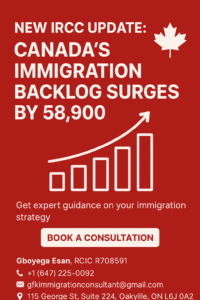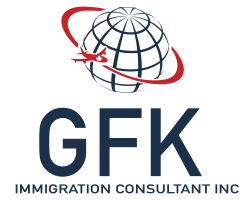
New IRCC Update: Canada’s Immigration Backlog Surges By 58,900
Canada’s immigration system, managed by Immigration, Refugees, and Citizenship Canada (IRCC), remains a cornerstone of the nation’s growth, welcoming newcomers who fuel economic prosperity, cultural diversity, and innovation.
On August 21, 2025, IRCC released its latest backlog data, offering a detailed snapshot of application inventories, backlogs, processing times, and decisions made across citizenship, permanent residency, and temporary residency categories.
With a total inventory of 2,226,600 applications and a backlog of 901,700 as of July 31, 2025, the data reveals persistent challenges.
This articles dives into the detailed numbers, explores trends, and provides insights for applicants, stakeholders, and anyone interested in the Canadian immigration landscape.
Table of Contents
A Snapshot of IRCC’s 2025 Immigration Performance
IRCC’s August 2025 update highlights the scale of Canada’s immigration system, processing millions of applications annually while striving to meet ambitious targets outlined in the 2025-2027 Immigration Levels Plan.
From January to July 2025, IRCC made 266,800 permanent residency decisions, welcomed 246,300 new permanent residents, granted citizenship to 86,400 individuals, and finalized 317,800 study permit and 825,600 work permit applications.
These figures underscore IRCC’s commitment to attracting global talent, reuniting families, and fostering integration, even as backlogs and high demand pose challenges.
However, the backlog—applications exceeding IRCC’s service standards—grew to 901,700 by July 31, 2025, up from 842,800 in June, representing 40.5% of the total inventory.
| Category | Total Inventory as of July 31 | Total Inventory as of June 30 | Backlogged as of July 31 | Backlogged as of June 30 | Within Service Standards as of July 31 | Within Service Standards as of June 30 |
| Citizenship | 254,900 | 252,700 | 48,800 | 47,400 | 206,100 | 205,300 |
| Permanent Residency | 892,400 | 896,100 | 443,500 | 415,800 | 448,900 | 480,300 |
| Temporary Residency | 1079300 | 1,040,700 | 409,400 | 379,600 | 669,900 | 661,100 |
| Total | 2,226,600 | 2,189,500 | 901,700 | 842,800 | 1,324,900 | 1,346,700 |
IRCC aims to process 80% of applications within service standards, but with 1,324,900 applications meeting these timelines, only 59.5% are processed on time, falling short of the target.
This article breaks down the data by category, examines the factors driving backlogs, and offers practical advice for navigating the system.
Citizenship Applications Breakdown
As of July 31, 2025, IRCC had 254,900 citizenship applications under processing, up slightly from 252,700 in June.
The backlog grew from 47,400 (18.7%) to 48,800 (19.1%), with 206,100 applications (80.9%) within the 12-month service standard, down from 205,300 (81.3%) in June.
Citizenship applications remain the most efficient category, with a backlog below 20%, closely aligning with IRCC’s 80% target.
From April 1 to July 31, 2025, Canada welcomed 86,400 new citizens, reflecting robust processing capacity.
The slight backlog increase suggests growing demand, but citizenship processing remains a bright spot compared to other categories.
The service standard for citizenship grants is 12 months, with 80.9% of applications under processing within this timeframe as of July 2025.
Complex cases—such as those requiring additional residency proof or security checks—contribute to the 19.1% backlog.
Citizenship certificates for applicants in Canada or the U.S. typically take 3-4 months longer when processed abroad or through embassies.
Permanent Residency Applications Breakdown
Permanent residency (PR) applications, covering programs like Express Entry, Provincial Nominee Programs (PNPs), and family sponsorships, had 892,400 applications under processing as of July 31, 2025, down slightly from 896,100 in June.
However, the backlog grew significantly from 415,800 (46.4%) to 443,500 (49.7%), with only 448,900 applications (50.3%) within service standards, compared to 480,300 (53.6%) in June.
The PR category faces intense demand, driven by the Canadian reputation as a destination for skilled workers, families, and refugees.
From January to July 2025, IRCC made 266,800 PR decisions and welcomed 246,300 new permanent residents, aligning with the 2025 target of 395,000 admissions.
Yet, with nearly half of applications backlogged, delays are a growing concern.
Service standards for PR vary by program:
- Express Entry: 6 months
- Spousal Sponsorship: 12 months
- Provincial Nominee Program (PNP): Varies, with Express Entry-aligned PNPs targeting 6 months
As of July 2025, only 50.3% of PR applications under processing meet service standards, far below the 80% target. Key program backlogs include:
- Express Entry: 22% backlog, above the 20% target
- PNP (Express Entry-aligned): 49% backlog, exceeding the 35% target
- Family Sponsorship: 14% backlog, close to the 15% target
- Atlantic Immigration Program (AIP): Processing times have risen to 17 months, up from 12 months last year
The backlog growth stems from high application volumes, complex cases, and resource constraints.
The 2025-2027 Immigration Levels Plan, announced October 24, 2024, reduced PR targets by 25% to 395,000 for 2025, aiming to ease system pressure.
However, with 892,400 applications under processing—enough to meet targets for two years—delays persist.
Temporary Residency Applications Breakdown
Temporary residency applications, including study permits, work permits, and visitor visas, had 1,079,300 applications under processing as of July 31, 2025, up from 1,040,700 in June.
The backlog grew from 379,600 (36.5%) to 409,400 (37.9%), with 669,900 applications (62.1%) within service standards, slightly up from 661,100 (63.5%) in June.
From January to July 2025, IRCC finalized 317,800 study permit applications and 825,600 work permit applications, reflecting Canada’s appeal to students and workers.
However, the 37.9% backlog indicates challenges in meeting the 80% processing target, particularly for visitor visas.
Service standards for temporary residency vary:
- Study Permits: 8 weeks
- Work Permits: Varies (e.g., 115 days for in-Canada applications, 3 weeks for International Experience Canada)
- Visitor Visas: Varies by country, with 15 days for in-Canada applications
- Study Permit Extensions: 120 days
- Study Permits: 30% backlog, down from 37% in March
- Work Permits: 36% backlog, down from 42% in March
- Visitor Visas: 65% backlog, above the 50% target
The inventory growth reflects Canada’s status as a global education and work hub, but high volumes challenge processing capacity.
For instance, Liam, a tech worker from Ireland, faced a delayed work permit, risking his job offer in Toronto.
The 2025-2027 Immigration Levels Plan sets temporary resident targets at 673,650 for 2025, aiming to reduce the temporary resident population to 5% of Canada’s total by 2026.
IRCC’s August 2025 update paints a mixed picture: significant progress in processing citizenship, PR, and temporary residency applications, but a growing backlog driven by high demand and complex cases.
Citizenship applications remain efficient, while PR and temporary residency face delays, particularly in PNP and visitor visa streams.
IRCC’s technological advancements, policy changes, and reduced immigration targets signal a commitment to improvement, but applicants must prepare for potential waits.
For those navigating the system, staying informed, submitting complete applications, and seeking professional guidance are key to success.
The Canadian immigration system remains a beacon of opportunity, and with continued efforts to streamline processes, IRCC aims to deliver on its promise of welcoming newcomers who shape the nation’s future.
GFK Immigration
Gboyega Esan RCIC R708591
Phone: +1 (647) 225-0092
